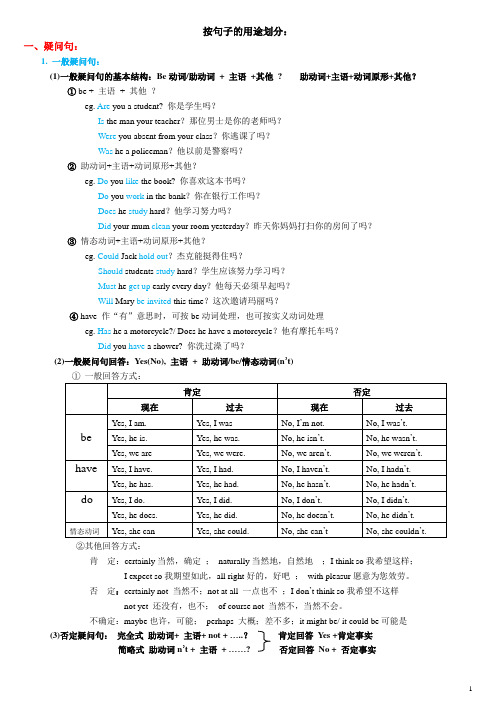初中疑问句、祈使句、感叹句
初中英语疑问句、祈使句、感叹句(39张)

door? -- As soon as I entered the room.
A.What B.When C.Where D.Why
4.--_C__ did Mr. Wang leave in a hurry?
2. 当must表示“必须”时,反意疑问部分用 mustn’t.
You must work harder next term, mustn’t you?
3. 当must表示“必要”时,反意疑问部分用 needn’t.
You must go home right now, needn’t you? 陈述句中有mustn’t(表示“禁止”)时, 反意疑问部分用must.
“疑问词+一般疑问句”
1.—_C___ schoolbag is this?
--I guess it’s Lily’s.
A.What B. Who C. Whose D. Which
2.--_A__ will tБайду номын сангаасe supper be ready? I’m hungry.
-- In a minute. A.How soon B.How long C.How much D.How often
一般疑问句特殊疑问句选择疑问句反意疑问句一般疑问句一般疑问句是表示询问事物或某种情况是否属实需要用来回答读时用升调
疑问句
你知道疑问句有几种吗?
一般疑问句、特殊疑问句、选择 疑问句、反意疑问句
一般疑问句
一般疑问句是表示询问事物或某种情况是 否属实,需要用_y_e_s__/ _n_o__来回答,读时 用升调。一般疑问句和陈述句之间存在着 一定的转换关系。
初中英语【五种简单句】祈使句感叹句

英语的句子按使用目的可分为陈述句、疑问句、祈使句和感叹句。
1)陈述句(Declarative Sentences):说明一个事实或陈述一种看法。
有肯定句和否定句之分。
2)疑问句(Interrogative Sentences):提出问题。
有以下四种:a. 一般疑问句( General Questions):Can you finish the work in time?你能按时完成工作吗?b. 特殊疑问句( W Questions; H Questions ):Where do you live?你住那儿?How do you know that? 你怎么知道那件事?c. 选择疑问句( Alternative Questions ):Do you want tea or coffee?你是要茶还是要咖啡?d. 反意疑问句( Tag-Questions ):He doesn't know her, does he?他不认识她,对不对?3)祈使句(Imperative Sentences):提出请求,建议或发出命令,例如:Sit down, please.请坐。
Don't be nervous!别紧张!4)感叹句(Exclamatory Sentences):表示说话人惊奇、喜悦、愤怒等情绪,例如:What good news it is!多好的消息啊!A.简单句的五种基本句型。
简单句的五种基本句型,对于提高同学们的听、说、读、写、译能力有至关重要的作用。
下面我们就一起再来回顾一下简单句的五种基本句型吧!简单句的五种基本句型包括:a.主语 +连系动词 +表语 (S+ Link-V+P)此句型中的谓语动词为连系动词,作表语成分的有形容词、名词、代词、分词、不定式介词短语等。
常见的系动词有be, feel, taste, smell, sound,seem, look(看起来 ), get(变 ),become(变 ),turn( 变 )等。
感叹句、祈使句、反义疑问句

感叹句一、定义:表达欢喜、悲伤、惊讶等感情的句子称为感叹句。
一般以疑问词what或how起始,而以惊叹号终结。
二、感叹句通常有以下形式:(一)由感叹词what引导的感叹句:"what"意为"多么"用作定语,修饰名词(被强调部分),单数可数名词前要加不定冠词a/an,复数可数名词或不可数名词前不用冠词。
1.What修饰名词或名词短语,有以下两种形式:What+a(an)+(形容词)+单数可数名词+主语+谓语!What+名词词组+主语+谓语!如:(1)What an apple this is!(2)What a fine day it is!2. What+(形容词)+可数名词复数或不可数名词+主语+谓语!如:(1)What beautiful flowers they are! 这些花多么漂亮呀!(2)What nice music it is!注意:在感叹句中,What a / an 常用来修饰单数可数名词,若其前面的形容词为元音开头,则用an。
what 是用来修饰复数可数名词和不可数名词。
但有些不可数名词,如rain, surprise, breakfast, lunch 等,当前面有形容词修饰,使抽象名词具体化时,则要用what a / an,如:(1)What a heavy rain it is! 多大的一场雨啊!(2)What a great surprise it is! 这多么令人惊奇啊!(3)What a rich breakfast it is! 多么丰盛的一顿早餐啊!(二)由How引导的感叹句。
How用来修饰形容词、副词或动词。
"how"意为"多么",用作状语,修饰形容词或副词(被强调部分)。
如果修饰形容词,则句中的谓语动词用系动词;如果how修饰副词,则句中的谓语动词用行为动词,其结构是:How+形容词(副词)+主语+谓语!How+形容词+ a [an] +名词+S+V… !如:(1)How clever the girl is!(2)How quickly the boy is writing!(3)How kind a man he is! 他这个人真好!注意:当how修饰动词时,“how+主语+动词”构成,动词不跟着感叹词提到主语之前。
初中英语语法思维导图总结 - 句法之疑问句,感叹句,祈使句和陈述句

按句子的用途划分:一、疑问句:1. 一般疑问句:(1)一般疑问句的基本结构:Be动词/助动词+ 主语+其他? 助动词+主语+动词原形+其他?①be + 主语+ 其他?eg. Are you a student? 你是学生吗?Is the man your teacher?那位男士是你的老师吗?Were you absent from your class?你逃课了吗?Was he a policeman?他以前是警察吗?②助动词+主语+动词原形+其他?eg. Do you like the book? 你喜欢这本书吗?Do you work in the bank?你在银行工作吗?Does he study hard?他学习努力吗?Did your mum clean your room yesterday?昨天你妈妈打扫你的房间了吗?③情态动词+主语+动词原形+其他?eg. Could Jack hold out?杰克能挺得住吗?Should students study hard?学生应该努力学习吗?Must he get up early every day?他每天必须早起吗?Will Mary be invited this time?这次邀请玛丽吗?④have 作“有”意思时,可按be动词处理,也可按实义动词处理eg. Has he a motorcycle?/ Does he have a motorcycle?他有摩托车吗?Did you have a shower? 你洗过澡了吗?(2)一般疑问句回答:Yes(No), 主语+ 助动词/be/情态动词(n’t)②其他回答方式:肯定:certainly当然,确定;naturally当然地,自然地;I think so我希望这样;I expect so我期望如此,all right好的,好吧;with pleasur愿意为您效劳。
否定:certainly not 当然不;not at all 一点也不;I don’t think so我希望不这样not yet 还没有,也不;of course not 当然不,当然不会。
初中英语语法系列___祈使句感叹句

A. What B. What a C. How D. How a
句型4:What + 形容词 + 不可数名词 + 主语 + 谓语! 如:
------“
bad weather!”
------“ Yes, but it’s going to be fine soon, I think.”
A. How B. What a C. What an D. What
祈使句中需要注意的一些情况
1、有时为了表示委婉语气,可在句首或句尾加上please,但 please加在句尾时,前面要用逗号隔开。
Please sit down. / Stand up, please. 2、在意思较为明显的情况下可一把谓语动词省去。 This way, please. 3、有时为了明确的向对方提出请求或发出命令,可加呼语,
例题bright girls // they are!中竖线前的girls是名词(且不是 单数),尽管前面有形容词bright也不用how。
此外,如果运用“逆推法”找不到该句谓语动词,说明该句主 语和谓语都被省略,这时只要判断该句最后单词的词性即可 按上述方法进行判定。
-----“
bad weather!”
请先比较下面三组例句: (1)Come early, and you’ll catch the first bus. (好的结果)
15 疑问句,祈使句和感叹句

2. 特殊疑问句
对句中某一特殊部分提出疑问,通常以who, which, where, when, why, how等疑问词开首. 特殊疑问句针对疑问词来回答, 不用yes或no. What is this? 这是什么? --It’s a ball. 是只球.
3. 选择疑问句
选择疑问句提供两个以上答案,要求对方选其一来回答. 回答时不用yes或no.而要用一个完整的句子或其省略形式 Would you like tea or coffee? 你想要茶还是咖啡? --Coffee, please. 请给我咖啡.
你认为这电影怎样? What do you think of the film? How do you like the film? How was the film? ---It’s good. ---It’s good. ---It’s good.
4. What does he look like?------What is he like? 询问某人外表举止如何.
(3) 与how相关的特殊疑问词
1. how 如何、怎样 (提问形容词、副词、介词短语)
We give a computer instruction 你妈妈怎样? (身体好吗) How is your mother? by putting a programme into it. How old are you? How far is it from Beijing to Shanghai? How big is your room? 如用动词cost(花钱),疑问词可用how much, 也可用what How much / What does this coat cost?
2. 疑问词+一般疑问句语序? (问宾语、谓语、表语、状态或定语)
初中英语语法归纳陈述句、疑问句、祈使句和感叹句

—___C___ . I like pop music.
A. Both
B. None
C. Neither D. Either
概念
结构
例句
—Must I finish the report today?
用yes, no来回 答的疑 问句为 一般疑 问句。
情态动词+主 语+ 动词原形
+ 其他?
助动词+主语 +动词原形/现 在、过去分词 +其他?
我今天必须完成这份报告吗? —Yes, you must. 是的,你必须完成。 —No, you needn’t./you don’t have to. 不, 你不必完成。
(2020·云南)
23. —___A_____was the car invented?
— It was invented in 1885.
A. When
B. Which
C. Who
D. Where
(2020湖北宜昌)
30. —_B_____ did the rules about keeping civilized dogs(文明
Do you want to go to the movies with me? 你想和我一起去看电影吗? Have you been to Tibet你去过西藏吗?
(2020甘肃白银) 句型转换。按括号内的要求转换下列句型。 (每空限填一词)
2. The Brows were watching TV when they got the phone call last night.(改为一般疑问句) _W__e_r_e____the Browns _w__a_t_ch__in_g_ TV when they got the phone call last night?
最新中考陈述句、感叹句、疑问句和祈使句

陈述句、感叹句、疑问句和祈使句中考主要考查疑问句的疑问词/组、祈使句、感叹句及反义疑问句的回答和它们之间的转换以及应用。
其中对疑问词的选择、感叹句的运用及反义疑问句的考查是重点。
一、陈述句陈述句用来陈述一件事或表达一种看法,有肯定和否定两种形式,句末通常用句号,读降调。
(一)陈述句的肯定式结构:主语+谓语+其他。
如:That boy always helps others.那个男孩经常帮助别人。
I went to the cinema with my friend yesterday.昨天我和朋友去电影院了。
(二)陈述句的否定式1. be的否定式(1)be用作系动词时,结构为:主语+be+not+表语+其他。
如:Tom was not at home yesterday.昨天汤姆不在家。
(2)be用作助动词,用于be doing/be going to do/be done等时态或被动语态中,结构为:主语+ be+ not+动词的现在分词或过去分词+其他。
如:Mother is not cooking. 妈妈没在做饭。
The sweater isn’t made of wool. 这件毛衣不是羊毛做的。
2. 助动词、情态动词的否定式The girl doesn’t do housework at home.这个女孩在家不做家务。
Man can’t live without water.没有水人类不能生存。
3. 除not外,其他否定词也可以构成否定句(1)用no表示,no=not any/a。
如:He has no child.=He doesn’t have any children.他没有孩子。
(2)never绝不,从来不。
如:I have never seen such a strange man.我从没见过这样奇怪的人。
(3)little, few几乎没有。
如:There are few students in the crowd.人群里几乎没有学生。
- 1、下载文档前请自行甄别文档内容的完整性,平台不提供额外的编辑、内容补充、找答案等附加服务。
- 2、"仅部分预览"的文档,不可在线预览部分如存在完整性等问题,可反馈申请退款(可完整预览的文档不适用该条件!)。
- 3、如文档侵犯您的权益,请联系客服反馈,我们会尽快为您处理(人工客服工作时间:9:00-18:30)。
(1)疑问句:用来提出疑问的句子。
可以分为:一般疑问句、特殊疑问句、选择疑问句和反意疑问句四种类型。
1)一般疑问句:能够用Yes或者No来回答的疑问句叫一般疑问句。
肯定回答用Yes,否定回答用No。
一般疑问句的结构是:Be+主语+表语+……?或者是:助动词/情态动词+主语+谓语+……?例如:-Are you a teacher? 你是老师吗?-Yes, I am. 是的,我是。
或:-No, I am not. 不,我不是。
—Does your mother go shopping on Sunday? 你妈妈星期天购物吗?-Yes, she does. 是的,她经常去购物。
不,她不经常去购物。
或:-No, she doesn’t.—Must we go at once? 我们必须立刻走吗?—Yes, we must. 是的,必须走。
或:—No, we needn’t. 不,没有必要。
注意:一般疑问句也可用表示肯定或否定的词来回答,如certainly(当然),surely(当然),of course(当然),I think so(我想是的),all right(好吧),certainly not(当然不是), not at all(一点也不), never(从不),sorry(很抱歉),not yet(还没有) I’m afraid not(恐怕不是)等。
2) 特殊疑问句:用来对句子的某一特殊部分提问的句子叫特殊疑问句。
特殊疑问句一般用降调。
其结构是:特殊疑问词+一般疑问句(+……)?对它的回答不能用Yes或者No,要根据询问的内容具体回答。
例如:-Where were you at that time? 那时你在哪里?—I was at home. 我在家。
常用的疑问代词有who(谁),whom(谁),whose(谁的),which(哪一个),what(什么);疑问副词有when(何时),where(何地),why(为什么),how(如何)以及“how+形容词”构成的短语。
例如:Who is your teacher? 谁是你的老师?(指人,作主语)Whom did you telephone to just now? 你刚才给谁打电话?(指人,作宾语)Whose coat is this? 这是谁的大衣?(作定语)Which child knows the answer? 哪个孩子知道答案?(作定语)What class are you in? 你在几班?(指物,作定语)When will you arrive?(提问时间)Where has he gone?(提问地点)Why are you late again?(提问原因)How do you often go to school? (提问方式)How far is it from your house to your school? (how far 提问距离)How often does he go to the French club? (how often 提问频率)3)选择疑问句:选择疑问句是提供两种或者两种以上的情况,问对方选择哪一种。
其结构可以用一般疑问句也可以用特殊疑问句,之间用连词or链接。
选择疑问句不能用yes或者no来回答,必须选择其中之一来回答。
例如:—Shall we go there by bus or on foot? 我们乘坐公共汽车去还是步行去?—We’ll go by bus. 我们乘坐公共汽车去。
—Which do you like better, tea or coffee? 茶和咖啡,你更喜欢哪种?—I like tea better. 我更喜欢茶。
4) 反意疑问句:也叫附加疑问句,是在陈述句的后面加一个简短问句,对陈述句所说的事实或者观点提出疑问或希望陈述句部分内容得到证实。
结构为“肯定陈述句+否定问句+?”或“否定陈述句+肯定问句+?”。
例如:你会来的,是吗?You are coming, aren’t you?You can’t swim, can you? 你不会游泳,对吗?她哥哥去年上的大学,是不是?Her brother went to college last year, didn’t he?注意:①陈述部分的主句带有no, never, nothing, nowhere, hardly, seldom, few, little等否定词或半否定词时,附加问句用肯定形式。
例如:You hardly speak English, do you? 你几乎不能说英语,对吗?They have few friends here, do they? 他们在这里几乎没有朋友,对吗?①There be句型的反意疑问句,其附加问句仍用there。
明天有个晚会,是不是?There will be a party tomorrow, won’t there?①陈述部分是一个主从复合句,附加问句一般要和主句一致。
但是当陈述部分是“I’m sure…, I’m afraid…, I (don’t) think / believe… +宾语从句”结构时,附加问句应与从句一致,而且要注意否定转移现象。
他说他上课迟到了,是吗?He said he was late for class, didn’t he?I don’t think he is good at math, is he? 我认为他不擅长数学,是不是这样?(否定转移)①反意疑问句的答语一般要根据事实用yes或no引导的简单问句回答,汉语的翻译有时和英语不一致。
例如:—She can’t swim, can she?她不会游泳,对吗?—Yes, she can. 不,她会。
你昨天没有在这里,对吗?—You weren’t here yesterday, are you?是,我不在。
—No, I wasn’t.(2)祈使句:祈使句是用来表示请求、命令、劝告、建议等语气的句子。
祈使句的主语一般是第二人称+动词原形+其他。
you,但往往省略,谓语一般用动词原形,否定句是用助动词don’t例如:Don’t be late next time. 下一次不要迟到。
Open the door, please. 请打开门。
有时候祈使句的后面用附加疑问句加强语气。
例如:Don’t tell it anyone, will you? 不要告诉任何人,好吗?(3)感叹句:表示喜怒哀乐等强烈感情的句子叫感叹句。
感叹句的末尾用感叹号。
句子开头经常用what 或者how。
1)How在感叹句中可以修饰形容词、副词、或整个句子等。
例如:How beautiful the skirt is! 这条裙子多漂亮呀!How tall your brother is!你的哥哥多高呀!How time flies! 时间过得真快呀!2)what在感叹句可以修饰名词。
如果名词是可数名词的单数形式,用what+a/an+(形容词)+名词+主语+谓语!如果是不可数名词或者可数名词的复数形式用What+(形容词)+名词+主语+谓语!例如:What a tall boy your brother is! 你哥哥是一个多么高的男孩!What beautiful pictures they are! 那些图画多美丽呀!注意:what和how引导的感叹句有时可以互换,但是要注意词序的变化。
例如:他是多聪明的孩子!What a clever boy he is! = How clever a boy he is!= How clever the boy is!I.单项选择。
1.—________ do you make a banana milk shake?—Peel the banana first and blend it with milk.A.What B.When C.How D.Where2.There are two libraries in this city,________?A.aren’t there B.aren’t they C.isn’t it D. is it,does she?3.—She doesn’t like geography—________.A.Yes,she does B.Yes,she doesn’t C.No,she does D. Yes,she is 4.________ information he offered us! We all thank him.A.What useful B.What useless C.How useful D.How useless 5.John,clean your room,________?A.will you B.shall we C.don’t you D.doesn’t he6.—________ won the 100th gold medal at the Olympics for China?—Zhang Yining.She’s from Beijing.A.Who B.What C.When D.Where7.Our hometown is more beautiful than before.________?A.isn’t it B.is it C.doesn’t it D.does it8.— ________ will the foreign students be back from Xibaipo?—In five days.A.How soon B.How often C.Flow far D.How fast9. ________ weather it is!A. What a fineB. How fineC. What fineD. How fine the10. -_______ day it is!-Let’s go out and have a picnic.A. How coldB. How niceC. What a cloudyD. What a lovely11. I suppose you are not going today, _________?A. are youB. do youC. don’t youD. aren’t you12.-Don’t you often go shopping?-_________. I work very late every day.A. Yes, I doB. No, I don’tC. Yes, I don’tD. No, I do13.-Linda had nothing for breakfast this morning , ________?-No, she got up too late.A. had sheB. hadn’t sheC. did sheD. didn’t she14.-_______ is that man over there?-That’s my brother.A. WhoB. WhatC. WhereD. How15.-______ did you have the party last night?-In the park.A. WhatB. WhyC. WhenD. Where16._______ sleep too late. It’s bad for your health.A. DoB. NotC. Don’tD. Isn’t17.________, and you will do well in physics.A. StudyingB. Study hardC. Studies hardD. To study hard18.You bought a new computer last week, ______?A. aren’t youB. don’t youC. didn’t youD. haven’t you19. _______ it’s blowing outside!A. What heavyB. How heavyC. How heavilyD. What heavily20. ________ Mrs. Smith is!A. How kind womanB. What a kind womanC. What kind womanD. How a kind womanII. 按括号内要求完成下列句式。
